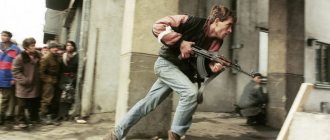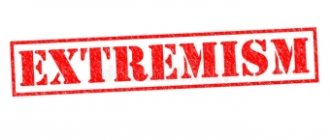1. The creation of an armed formation (association, detachment, squad or other group) not provided for by federal law, as well as the leadership of such a formation or its financing -
shall be punishable by imprisonment for a term of ten to twenty years with restriction of freedom for a term of one to two years.
2. Participation in an armed formation not provided for by federal law, as well as participation on the territory of a foreign state in an armed formation not provided for by the legislation of that state, for purposes contrary to the interests of the Russian Federation, -
shall be punishable by imprisonment for a term of eight to fifteen years with restriction of freedom for a term of one to two years.
Note. A person who has committed a crime under this article for the first time, who voluntarily ceased participation in an illegal armed group and surrendered weapons, is exempt from criminal liability unless his actions contain another crime.
- Article 207.2. Public dissemination of deliberately false socially significant information, resulting in grave consequences
- Article 209. Banditry
Commentary to Art. 208 of the Criminal Code of the Russian Federation
The object of the crime is public safety.
Parts 1 and 2 art. 208 of the Criminal Code of the Russian Federation are independent elements of crimes.
The objective side of the crime provided for in Part 1 of Art. 208 of the Criminal Code of the Russian Federation, includes two alternative actions: creation and leadership of an armed formation. The objective side of the crime provided for in Part 2 of Art. 208 of the Criminal Code of the Russian Federation, consists of participation in an armed formation.
A mandatory element of the crime is the illegality of the armed formation. In accordance with paragraph 9 of Art. 1 of the Federal Law of May 31, 1996 N 61-FZ “On Defense” the creation and existence of formations that have a military organization or weapons and military equipment, or which provide for military service not provided for by federal laws, is prohibited and prosecuted by law.
———————————
NW RF. 1996. N 23. Art. 2750.
Thus, an armed formation not provided for by federal laws is illegal. Such laws include, for example, Law of the Russian Federation dated April 18, 1991 N 1026-1 “On the Police”, Federal Law dated February 6, 1997 N 27-FZ “On Internal Troops of the Ministry of Internal Affairs of the Russian Federation”, Federal Law dated April 3, 1995 “On the Federal Security Service” and some others. There is no consensus regarding the concept of “formation” in the legal literature. Some authors believe that in order to reveal its content, it is correct to turn to the Russian language dictionary and understand by such a formation an association of persons similar in its characteristics to a military unit. Others believe that at least two participants are sufficient for formation.
———————————
Maltsev V. Responsibility for organizing an illegal armed group or participating in it.
Galakhova A.V. Trial by jury: qualification of crimes and procedure for considering cases. M., 2006
From our point of view, when defining the concept of “formation”, one should proceed from a comparison with the size of the lowest echelon of a legal armed military formation - a squad, consisting, as a rule, of at least ten people. This approach is due to the fact that the armed formation is called upon to solve combat missions, which, in turn, must be provided with certain personnel. At the same time, attention should be paid to the fact that specific combat operations can be carried out by a smaller number of people included in the formation.
An illegal armed group is a group of people organized outside the framework of federal laws who possess weapons, the number and destructive power of which are sufficient to carry out one-time actions or long-term military operations, and pose a threat to the constitutional order, territorial integrity, individual rights and freedoms as elements of public security.
The creation of an illegal armed formation refers to the actions of selecting and recruiting members of the formation, providing them with weapons, developing the structure and “charter” of this illegal association, and setting any goals and objectives for ordinary members of the association.
A mandatory feature of a formation is its armament, i.e. members of an association, detachment, squad or other group have firearms or bladed weapons, including throwing weapons, gas weapons (pistols, revolvers), as well as pneumatic weapons with a muzzle energy of more than 7.5 J and a caliber of more than 4.5 mm. The presence of types of weapons and weapons not provided for by the Law “On Weapons”, for example, bacteriological, chemical, artillery, is also not excluded.
Not all members of the formation may be armed. This does not affect the existence of a crime.
The leadership of an illegal armed formation is expressed in determining the directions of activity of an already created formation (developing plans, conducting classes, organizing duties, placing personnel, etc.).
The elements of the crime are formal, the act is completed from the moment of creation or leadership of an illegal armed group.
The subjective side of the crime is characterized by direct intent. The culprit realizes that he is creating an illegal armed group and wants to create it.
The general subject of the crime is a sane person who has reached the age of sixteen.
Part 2 of Art. 208 of the Criminal Code of the Russian Federation provides for liability for participation in an armed formation not provided for by federal law.
Participation in an illegal armed formation means joining it and performing any actions in accordance with the plans of this formation. Participation in an illegal armed group can be expressed in the performance of various types of tasks to arrange the location; in carrying out patrolling, duty; in the presence of ongoing classes and exercises, etc.
The elements of the crime are formal, the act is completed from the moment of performing any action indicating the participation of a person in an armed formation.
The subjective side of the crime is characterized by direct intent. The perpetrator realizes that he is participating in the specified formation and wants to take appropriate actions.
The general subject of the crime is a sane person who has reached the age of sixteen.
The organization of an illegal armed group and participation in it should be distinguished from the composition of an armed rebellion, provided for in Art. 279 of the Criminal Code of the Russian Federation. The difference lies in the subjective and objective side of the crime. An armed rebellion presupposes the presence of a goal and actions directly aimed at overthrowing or changing the constitutional system of the Russian Federation, which is not included in the subjective and objective side of the creation of an illegal armed group. When organizing an illegal armed group and armed rebellion, the act should be qualified according to the totality of crimes provided for in Art. Art. 208, 279 of the Criminal Code of the Russian Federation.
According to the note to Art. 208 of the Criminal Code of the Russian Federation, a person who voluntarily ceases participation in an illegal armed group and surrenders weapons is exempt from criminal liability unless his actions contain another crime. Thus, the application specified in the note to Art. 208 of the Criminal Code of the Russian Federation is possible if three conditions are met: a) voluntary termination of participation in an illegal armed formation; b) surrender of weapons; c) the absence of other elements of a crime in the person’s actions. The question of whether the note applies to the leader of an illegal armed group, we believe, should be decided negatively based on the literal meaning of the interpretation of the note. In addition, the activities of the organizer are more socially dangerous compared to the acts of another participant in an illegal armed group. Even with a voluntary cessation of the crime, the organizer must not only stop his own actions, but also ensure the liquidation of the illegal armed group and its dissolution. Therefore, only the withdrawal of the organizer from the illegal armed group can only be regarded as a circumstance mitigating the punishment.
Organization of an illegal armed group or participation in it
1. The creation of an armed formation (association, detachment, squad or other group), not provided for by federal law, as well as the leadership of such a formation or its financing -
is punishable by imprisonment for a term of ten to twenty years, with restriction of freedom for a term of one to two years. years.
2. Participation in an armed formation not provided for by federal law, as well as participation on the territory of a foreign state in an armed formation not provided for by the legislation of that state, for purposes contrary to the interests of the Russian Federation, -
shall be punishable by imprisonment for a term of eight to fifteen years with restriction of freedom for a term of one to two years.
Note.
A person who has committed a crime under this article for the first time, who voluntarily ceased participation in an illegal armed group and surrendered weapons, is exempt from criminal liability unless his actions contain another crime.
Judicial practice under Article 208 of the Criminal Code of the Russian Federation
Appeal ruling of the Supreme Court of the Russian Federation dated June 15, 2017 N 201-APU17-19
After M. served his sentence, it was established that he was also guilty of other crimes that he committed before the verdict of June 24, 2014, namely: inducement in period from October 2013 to May 2014 four persons for committing a crime under Part 2 of Art. 208 of the Criminal Code of the Russian Federation, and in public calls for extremist activities in the period from December 14, 2013 to March 21, 2014.
Appeal ruling of the Judicial Collegium for Military Personnel Cases of the Supreme Court of the Russian Federation dated June 25, 2018 N 205-APU18-9
sentenced to imprisonment: under Part 1 of Art. 208 of the Criminal Code of the Russian Federation for a period of 12 years 6 months with restriction of freedom for a period of 1 year 6 months; according to Part 2 of Art. 222 of the Criminal Code of the Russian Federation for a period of 3 years; according to Part 2 of Art. 222.1 of the Criminal Code of the Russian Federation for a period of 4 years, using Art. Criminal Code of the Russian Federation, without penalty; according to Part 2 of Art. 205.5 of the Criminal Code of the Russian Federation for a period of 13 years, and in accordance with Part 3 of Art. of the Criminal Code of the Russian Federation for a totality of crimes by partial addition of punishments - for a period of 17 years in a high-security correctional colony with restriction of freedom for a period of 1 year 6 months with the establishment of the prohibitions and restrictions specified in the verdict;
Appeal ruling of the Judicial Collegium for Military Personnel Cases of the Supreme Court of the Russian Federation dated June 28, 2018 N 201-APU18-22
According to the verdict, the convicted Nazarov was found guilty of involving a person in the commission of crimes under Art. Art. 205, 205.5 and 208 of the Criminal Code of the Russian Federation, as well as attempted illegal sale of narcotic drugs on a large scale. The crimes were committed on the territory of St. Petersburg in the period from February 22 to October 19, 2017 under the circumstances detailed in the verdict.
Appeal ruling of the Supreme Court of the Russian Federation dated July 12, 2017 N 205-APU17-21
According to the note to Art. 205.3 of the Criminal Code of the Russian Federation, a person who has committed a crime under Art. 205.3 of the Criminal Code of the Russian Federation, is exempt from criminal liability if it informed the authorities about the completion of training, knowingly for the student, conducted for the purpose of carrying out terrorist activities or committing one of the crimes provided for in Art. Art. 205.1, 206, 208, 211, 277, 278, 279, 360 and 361 of the Criminal Code of the Russian Federation, contributed to the disclosure of the crime committed or the identification of other persons who underwent such training, carried out, organized or financed such training, as well as the places where it was carried out and if in it actions do not contain any other corpus delicti.
Appeal ruling of the Judicial Collegium for Military Personnel Cases of the Supreme Court of the Russian Federation dated 08/07/2018 N 205-APU18-15
convicted of committing crimes under Part 2 of Art. 208 of the Criminal Code of the Russian Federation (as amended by Federal Law No. 130-FZ of May 5, 2014), to imprisonment for a period of 6 years with restriction of freedom for a period of 1 year, Art. 205.3 of the Criminal Code of the Russian Federation (as amended by Federal Law No. 130-FZ of May 5, 2014), to imprisonment for a term of 16 years with restriction of freedom for a period of 1 year, and on the basis of Part 3 of Art. of the Criminal Code of the Russian Federation on the totality of crimes committed by partial addition of the imposed sentences of imprisonment for a period of 17 years in a maximum security correctional colony with restriction of freedom for a period of 1 year 6 months, with the establishment of certain restrictions and obligations specified in the sentence.
Appeal ruling of the Judicial Collegium for Military Personnel Cases of the Supreme Court of the Russian Federation dated 08/09/2018 N 205-APU18-18
sentenced to imprisonment for a term of 6 years for committing a crime under Part 2 of Art. 205.5 of the Criminal Code of the Russian Federation (as amended by Federal Law of November 2, 2013 N 302-FZ); for a period of 6 years with restriction of freedom for a period of 1 year for committing a crime under Part 2 of Art. 208 of the Criminal Code of the Russian Federation (as amended by Federal Law No. 130-FZ of May 5, 2014).
Appeal ruling of the Judicial Collegium for Military Personnel Cases of the Supreme Court of the Russian Federation dated August 16, 2018 N 205-APU18-17
In the appeal, the convicted Sugaipov, expressing disagreement with the verdict and considering it illegal and unfounded, and the punishment imposed on him is excessively harsh, asks to reclassify what he did under Art. 205.6 of the Criminal Code of the Russian Federation - failure to report to the authorities about D., who committed a crime under Part 2 of Art. 208 of the Criminal Code of the Russian Federation. The convicted person asks to take into account, when assigning punishment under this article of the Criminal Code of the Russian Federation, his active assistance in exposing D. in committing the specified crime.
Appeal ruling of the Judicial Collegium for Military Personnel Cases of the Supreme Court of the Russian Federation dated August 15, 2018 N 205-APU18-19
investigator's decisions dated August 2, 29 and September 12, 2016 to initiate a criminal case against T., to charge him in absentia with committing crimes in Syria under Part 2 of Art. 205.5 and part 2 of Art. 208 of the Criminal Code of the Russian Federation, as well as putting him on the international wanted list;
Appeal ruling of the Judicial Collegium for Military Personnel Cases of the Supreme Court of the Russian Federation dated September 20, 2018 N 201-APU18-37
- resolutions of November 6, 2015 and January 28, 2016 on the initiation of criminal proceedings against K. and other persons on the grounds of a crime under Part 2 of Art. 208 of the Criminal Code of the Russian Federation, on the fact of their participation in the IG MTO, and on putting K. on the international wanted list;
Appeal ruling of the Judicial Collegium for Military Personnel Cases of the Supreme Court of the Russian Federation dated September 13, 2018 N 205-APU18-22
According to the verdict, Orozbayev was found guilty and sentenced for the fact that, as the head of the municipal formation of the Kucherlinsky village council of the Turkmen district of the Stavropol Territory, using his official position, in the period from December 2013 to January 2015 in a. Sharakhalsun of the Turkmen district of the Stavropol Territory persuaded B. to commit crimes under Art. Art. 205.3, 208 of the Criminal Code of the Russian Federation, and in the period from January 23, 2015 to March 2016, in the Stavropol Territory, he financed terrorism under the circumstances set out in the verdict.
Appeal ruling of the Judicial Collegium for Military Personnel Cases of the Supreme Court of the Russian Federation dated September 20, 2018 N 203-APU18-19
Draws attention to the fact that the illegal actions of persons against the combined police detachment from Bashkiria, who committed a crime on May 9, 2016, were qualified under Art. Art. 317 and 208 of the Criminal Code of the Russian Federation, therefore there are no grounds to accuse him of justifying terrorism. The fact of registering a page on the Internet under the pseudonym “A.” and the presence of telephone numbers ... and ... the first of which has a connection to the network, do not in themselves indicate his involvement in the commission of the incriminated crime.




